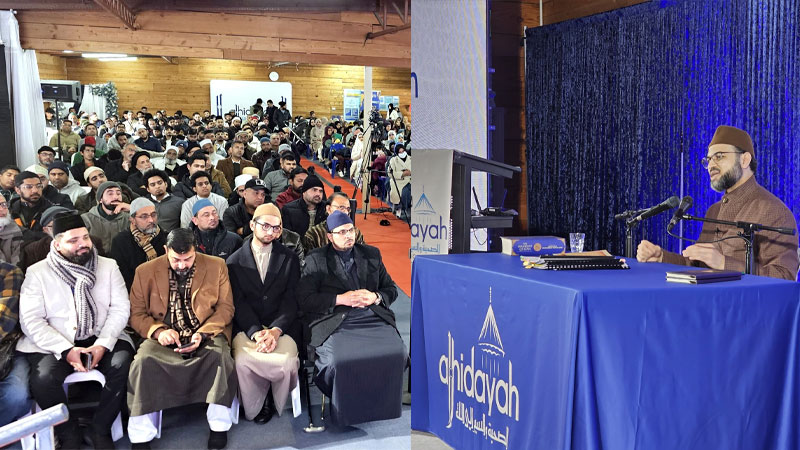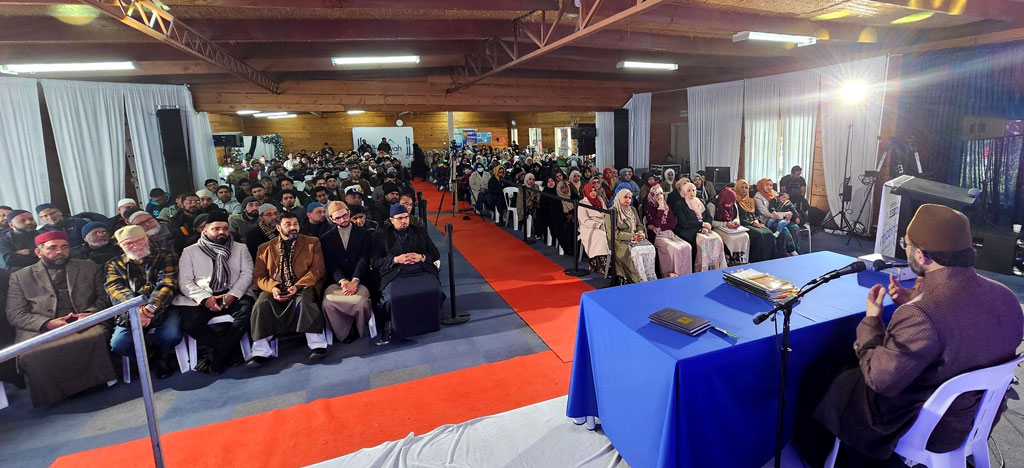
On the second day of Al-Hidayah 2024 Australia, Dr. Hassan Mohiuddin Qadri, Chairman Supreme Council of MQI, delivered a profound lecture on "Why Do You Need a Shaykh?" Accompanying him were President Minhaj-ul-Quran International Prof. Dr. Hussain Mohi-ud-Din Qadri, President of Minhaj-ul-Quran Women League International Dr. Ghazala Qadri, and Shaykh Ahmad Mustafa al-Arabi al-Qadri.
Dr. Hassan Qadri emphasized the crucial role a Shaykh plays in a believer's journey towards Allah and His Messenger, Prophet Muhammad ﷺ. He explained that a Shaykh is essential for spiritual growth and alignment with Islamic teachings.
Drawing from the wisdom of scholars like Imam Al-Ghazali (RA), Dr. Hassan
Qadri narrated the story of Hazrat Junaid Al-Baghdadi (RA), the Shaykh of Shaqiq
Al-Balkhi, who was the Shaykh of Abu Abd al-Rahman Hatem al-Asamm (RA). This
lineage highlights the importance of learning from those deeply rooted in
Islamic knowledge.
Dr. Hassan Qadri shared eight valuable lessons from Hatem Al-Asamm (RA), learned
during his 30 years under Hazrat Shaqiq Al-Balkhi (RA):
1. Choosing the Beloved: Hatem (RA) observed that worldly beloveds cannot accompany a person to the grave. Therefore, he chose the Quran, Hadith, and righteous deeds (Amal-e-Saleh) as his beloved. This insight teaches us to prioritize our spiritual obligations and cultivate a relationship with Allah Subḥānahu Wa-Taʿālā that endures beyond this life.
2. Overcoming Desires: He recognized that people often follow their desires and nafs (ego), becoming slaves to their whims. Hatem (RA) chose to follow the guidance of the Holy Quran instead. This lesson emphasizes the importance of self-discipline and adherence to divine guidance over worldly temptations.
3. Wealth Distribution: Noticing that people accumulate wealth for
themselves, Hatem (RA) chose to distribute whatever he had to the needy. He
understood that true wealth lies in generosity and supporting those in need.
This principle encourages believers to view their possessions as a means to gain
Allah's pleasure through charity.
4. True Nobility: Hatem (RA) realized that true nobility and respect come from
piety and God-consciousness, not social status or wealth. He emphasized that
nobility is associated with one’s relationship with Allah Almighty, not worldly
achievements. This perspective shifts the focus from material success to
spiritual integrity.
5. Avoiding Envy: He observed that people disturb others out of envy and jealousy. Hatem chose to trust in Allah's distribution of sustenance and avoid feelings of envy. This lesson teaches the importance of contentment and reliance on Allah’s wisdom in providing for all His creations.
6. Hostility: Hatem (RA) decided to refrain from hostility and seek peace, recognizing that aggression stems from personal insecurities and fears. He found that true peace and security come from surrendering to Allah Almighty's will. This insight encourages believers to foster harmony and avoid conflict.
7. Relying on Allah Almighty: Hatem (RA) emphasized the importance of relying solely on Allah Almighty, not on wealth, business, or human creations. He understood that ultimate security and success come from divine reliance. This lesson reinforces the concept of Tawakkul, or placing complete trust in Allah Almighty.
8. Best Company: He learned that the best company is that which helps you remember and praise Allah Almighty. Being in the presence of pious individuals strengthens one’s faith and encourages righteous actions. This lesson underscores the significance of surrounding oneself with positive influences.
Dr. Hassan Qadri illustrated true spiritual leadership with anecdotes about Shaykh-ul-Islam Dr Muhammad Tahir-ul-Qadri. He recounted Shaykh-ul-Islam's humility at holy shrines and a personal story highlighting his dedication and selflessness.
Dr. Hassan Qadri concluded by emphasizing that true nobility lies in God-consciousness, not wealth or status. He stressed the importance of avoiding envy, relying on Allah Almighty, and keeping company that reminds one of Him.
This session underscored the importance of having a Shaykh for spiritual guidance, providing attendees with deep insights into Islamic tradition and the practical implications of following a spiritual guide.
Esteemed attendees and a substantial gathering of youth from across Australia graced the event with their presence.



Comments